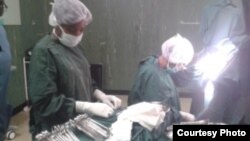The Fistula Foundation, an American-based organization, which caters for women with birth complications, is set to launch an obstetric fistula treatment scheme in Zimbabwe, targeting women who find themselves ostracized by families and communities.
In a program supported by the Fistula Foundation earlier this year, 14 Zimbabwean women suffering from birth injuries were operated on by Ethiopian-based Fistula surgeon Dr. Ambaye Wolde Michael of the Women and Health Alliance.
According to the World Health Organization, an estimated 2 million young women are living with untreated obstetric fistula in Asia and Sub-Saharan Africa.
Many of these women live in silence with the treatable medical condition, which can lead of bladder and skin infections, kidney disorders and at times death if left untreated. Obstetric fistula is a serious internal organ injury sustained by women during child birth.
Kate Grant, Chief Executive Officer of the Fistula Foundation, says the condition is life altering for women, who are usually in their early to late teens.
“One of the things that’s most heart breaking about this is that it happens on generally a first birth, where a woman is giving birth for the first time, she’s often in her late teens early 20s and she’s excited about having a baby,” said Grant.
COMPLICATED BIRTHS
She added that many babies normally pass away in complicated births and the mother is left with injuries that often leave her totally disempowered.
Grant said in many developed nations, people facing this medical condition can alleviate the issue with adult diapers and even by simply having running hot water, usually not accessed by large numbers of rural women in Africa.
“The women often end up ostracized because of the odor that’s produced and on top of this horrendous injury the psychological wounds are also profound,” said Grant.
Many women in these situations often become isolated from their communities; they frequently get left by husbands and are forced to go back to their original families.
Zimbabwe, currently attempting to reach its Millennium Development Goals, which include improving maternal health under goal number five, is expected to be among 29 nations to benefit from the Fistula Foundation’s obstetric fistula treatment program.
MATERNAL HEALTH CARE
The United Nations International Children's Emergency Fund (UNICEF) says Zimbabwe has seen huge improvements in its prenatal, newborn and maternal health care over the past five years.
The number of pregnant women who received prenatal care has increased in the past few years from 57 to 90 percent, while mothers accessing care after giving birth increased from 27 to 78 percent.
Grant said with the gains in many health care systems within countries like Zimbabwe, there is still need for emergency obstetric treatment in the health delivery systems.
The success of the Fistula Foundation’s programs have provided 10,000 surgeries over the past five years, is shown in the stories of treated women, including one from Chad, who suffered with her injury for nearly 15 years.
“Her husband had also abandoned her and most of her community members rejected her, and she was least helped by her family,” explained Grant, noting that “surgery ended up being able to fix her and that’s just one story of one woman in Chad but there is 10,000 others like that.”
In Zimbabwe, like the 28 countries including Zambia, Tanzania, and Uganda among other, where the Fistula Foundation currently operates, the organization will be launching the pilot program through funding doctors that treat obstetric fistula.
The program is expected to start in the coming months.











